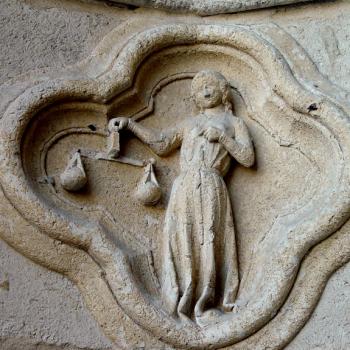
The Christian life is meant to have us take on grace, allowing it to transform us in order to become more and more like God. And as God is love, that means, we are to reflect that love in all things we do. The more we reflect love, the more, then, we have let grace do what it is meant to do. Therefore, we should hope that the more we have embraced grace, the more God and God’s love will be reflected through us, so that others can and will sense that love and want to have a share of it themselves. As Christians. all that we do, even when it is not directly related to love, should still be connected, in some way, with love. When we refine ourselves, that is, when we seek to make ourselves better, we should find ourselves loving more, and loving better, so that in the end, we find we love others with less and less hindrances. For love, as Paul says, is what ties everything together. “And above all these put on love, which binds everything together in perfect harmony” (Col. 3:14 RSV).
When we ignore love, indeed, if we try to do things without connecting it in some way to love, we might do amazing feasts such as fasting for several times, keeping awake all night in a vigil, or writing some subtle theological treatise, but none of it will matter, for without love, it is all for naught. Indeed, without love, our actions, however extraordinary they might seem, will be unbalanced, as they will not have the proper center which is needed to properly direct us to what is good and true. With such an imbalance, not only will they not lead us to righteousness, they might indeed become tools for evil. For example, love helps keep us humble and away from ungodly pride, but without love, such pride can and will rise up in us, make us think we are great for what we have done, and so pervert the value of our actions, as we start to glorify ourselves and judge others for not being like us. That is, pride encourages us to have a dangerous judgmental attitude towards the world, looking for ways to condemn others. We can see this in the way so many engage doctrinal discussions – how many people just want to show off what they know so as to look like they are better than others, not realizing how far off they are from true theology because they have turned theology into a mere doctrinal debate without any connection to praxis and the love which should form the foundation of that praxis?
So many things which we do, such as fasting, such as displaying our knowledge, such as staying awake in an all-night vigil (or “keeping watch” all night), can be and are done by those who are far from holy. Thus, many spiritual masters have warned us not to be so focused on such extraordinary actions, for they can and often are done for an evil purpose, as can be seen in the way evil spirits do such things naturally while remaining evil:
The fathers used to say, “The devil can imitate everything. As for fasting, he never ate; as for watching, he never slept. But humble mindedness and love he cannot imitate. So let there be a great effort on our part to have love within us and hate pride, through which the devil fell out of heaven.” [1]
The point, then, is that our actions must be properly rooted and directed by love. Many people fast, or diet, and they are not holier for the effort. They might better themselves, as fasting can help some people become healthier, but to become spiritually healthier, the fast has to include love and be guided foremost by such love. Similarly, there are many who stay up all night long in a vigil, looking to find a way, through their vigil, to strengthen their will so that they can resist all kinds of temptation, acting, as it were, like a soldier standing watch at their camp in the middle of a war. But if they don’t first embrace love, they will ignore and let through all kinds of evil thoughts. Though they prove themselves capable of warding off some temptations, it was all for naught, as they let the greatest evil come through and build up within themselves.
Love is what is important. We are to connect all the things with do with love. And when we pursue knowledge, when we fast, when we try to stay on guard against temptation, we must do so with love if we want to attain the good which they can offer us. Indeed, not only should we do them with love, but we should to use such disciplines as a way to develop our love, to become greater lovers. Love should be both the foundation and the goal, with the difference, of course, is that our goal should be to have greater love than what we started with:
An elder said, “Let us acquire love, the summation of good things. Fasting is nothing, watching is nothing, and so is any other discipline if love is absent, for it is written, ‘God is love’” [ 1 John 4:16].[2]
This is why it is possible to say the fulfillment of the law is found in love (cf. Rom. 13:8). The law itself seeks to direct us so that we can become holy and holiness is found in and with love. The law is not able to have us perfect our love all by itself. It is only through the greater love of God, which is shared to us, that we are able to attain that goal. And for that to happen, we must desire that love, for it is when we desire it that we will engage it, let it come into us and build us up. Then, we will find, our actions, and whatever disciplines we engage, can help us build upon that love. Then, we will find that there can be some value with fasting, with all-night vigils, and indeed, with theological discourses. They are to be tools to help us love more, and through that love, to draw ourselves closer to God so that we can then become enlightened and deified by God’s grace. Fasting, nightly vigils or prayer, and theological studies, when engaged properly, are ways for us to exercise our love. But, as with exercises done without proper precaution, when done wrong, they can and will end up hurting us more than they help. For love, once again, should be the foundation and the goal of our actions. The more we develop our love, the more we will find ourselves drawn into God and receive more and more grace, more and more love; and the more we love, the more we will experience and realize God’s love for us, and in that love, better apprehend God’s presence. “No man has ever seen God; if we love one another, God abides in us and his love is perfected in us” (1 Jn. 4:12 RSV).
[1] John Wortley, trans., The Book of the Elders: Sayings of the Desert Fathers (Collegeville, MN: Cistercian Publications, 2012), 308 [N 636].
[2] John Wortley, trans., The Book of the Elders: Sayings of the Desert Fathers, 308 [N 636].
Stay in touch! Like A Little Bit of Nothing on Facebook.
If you liked what you read, please consider sharing it with your friends and family!
N.B.: While I read comments to moderate them, I rarely respond to them. If I don’t respond to your comment directly, don’t assume I am unthankful for it. I appreciate it. But I want readers to feel free to ask questions, and hopefully, dialogue with each other. I have shared what I wanted to say, though some responses will get a brief reply by me, or, if I find it interesting and something I can engage fully, as the foundation for another post. I have had many posts inspired or improved upon thanks to my readers.













